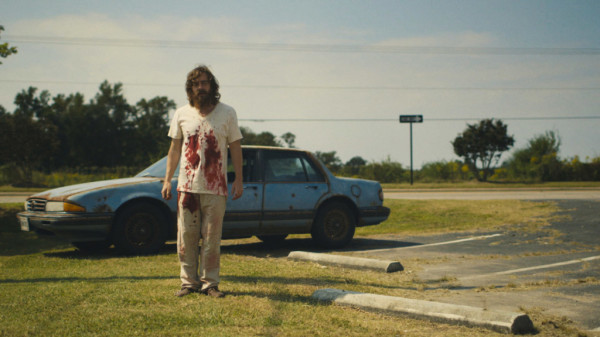
Blue Ruin’s opening introduces us to the largely mute, feral-bearded vagrant Dwight (Macon Blair) living out a life of scrounging for discarded food and sleeping in an abandoned car. One morning, he is told by a police officer that a particular seemingly important person has been released from prison. Within the film’s first twenty minutes, we are treated to both this basic introduction and a tense, brutal burst of inelegant vengeance against the newly released man. Reserving the back-story for later, Blue Ruin’s devious, shocking first act is a masterful example of economic visual storytelling. What follows, in which the target’s family attempt to return the favour, rarely comes close to reaching the same heights. The plot follows the major rules of storytelling, however, sometimes they’re dismissed. You may see the analysis and, probably, other kinds of custom essay at https://qualitycustomessays.com.
Blue Ruin has been promoted with comparisons to the work of the Coen brothers, and admittedly Jeremy Saulnier’s sophomore feature as a director is a thriller of escalating violence somewhat in the vein of Blood Simple, peppered with the kind of dark humour that has characterised the brothers’ films following that 1984 debut.
The major difference with the tone of Saulnier’s film is that the Coens will sometimes throw outright stupid or crazy people into their narratives of crap repeatedly hitting the fan. Blue Ruin’s Dwight proves out of his element in many ways, but his ineptitude and failings are more of the tragically relatable variety. Dwight clearly knows a few tricks of survival but even in that vicious opening we see him fail to get the safety lock off of a stolen weapon. Once the beard comes off and the dress shirts come on, the streetwise killer allure is gone, replaced by a peculiar form of easily spooked, everyman meekness uncharacteristic of any other film exploring the idea of recurring violent deeds.
This is a man who convinces himself to perform extreme actions, but otherwise lacks the obvious insanity or expertise to rationalise the path he takes. It’s this central character conceit and the crisp cinematography that make Blue Ruin mostly compelling, though its final half hour proves something of a languid drag, with a disappointing climax in which attempts at grander statements about retribution, like those pulled off better in David Cronenberg’s A History of Violence, don’t quite gel with some wobbly cinematic execution of that bloodshed. Still, the darkly comedic subversions beforehand and a great lead performance provide much to recommend.
Josh has awarded Blue Ruin three Torches of Truth
















{ 0 comments… add one now }